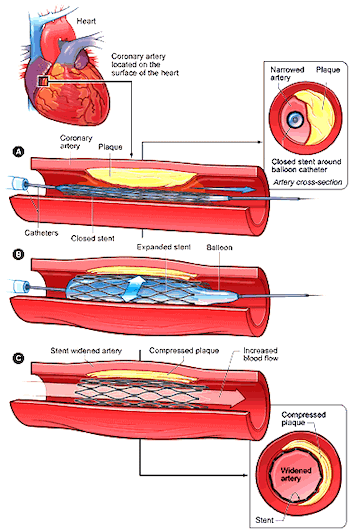Many people who receive one stent will need additional stents, but as the number of devices in the heart increases, so do the risks of serious complications.
 If a coronary artery has become narrowed, reducing healthy blood flow through your heart, your doctor may recommend that you have a stent placed in that artery.
If a coronary artery has become narrowed, reducing healthy blood flow through your heart, your doctor may recommend that you have a stent placed in that artery.
A heart stent is a small mesh tube that helps open up a blocked artery to allow for improved blood flow. A surgeon uses a catheter to insert a collapsed stent into a blood vessel (often in your wrist or groin) and guide it to the narrowed portion of the artery, where they then expand it to improve circulation.
It’s not uncommon for a person who needs one stent to need additional stents in the same or other coronary arteries.
But how many heart stents someone can have depends on the nature of their heart disease, the location and extent of the blockages within the arteries, and other factors, such as whether surgery is necessary given the person’s health and the location of the plaques.
~ What Is the Most Heart Stents a Person Can Have? ~
The 2021 guidelines for coronary artery revascularization do not mention a maximum number of heart stents that a person can or should receive.
Instead, the guidelines suggest that healthcare professionals should strongly consider bypass surgery, rather than stenting, for certain people with blockages in multiple coronary arteries — especially people with diabetes.
In coronary artery bypass grafting (CABG), a surgeon removes a small section of a blood vessel from elsewhere in your body and attaches it to a narrowed artery, routing blood flow around the portion of the artery that is blocked. A CABG procedure is often preferred if the plaque is located in the left main coronary artery.
There are pros and cons to all these heart-related treatments, including percutaneous coronary interventions (PCIs), which are nonsurgical procedures used to treat coronary artery blockages. You can read more about these other procedures, including PCIs, and their possible side effects.
~ Can You Have 4 or More Stents? ~
 You can have four or more stents, but it’s important to understand that the more stents you receive, the greater the risk of complications will be.
You can have four or more stents, but it’s important to understand that the more stents you receive, the greater the risk of complications will be.
A 2019 study suggests that, for people over the age of 50 years, the risk of restenosis (the re-narrowing of an artery that has previously been treated) increases by 36% with each additional stent.
While bypass surgery may be a better option than having multiple stents implanted, not everyone is a good candidate for CABG.
People who are too frail for most major surgeries or who have severe heart failure, chronic obstructive pulmonary disease, or certain other conditions may have no choice but to receive several stents.
~ How Long Does a Heart Stent Last? ~
A heart stent should be a permanent fixture. But there are times when a stent has to be redone or when other procedures become necessary because the artery has narrowed again.
The British Heart Foundation reports that in about 2-3% of cases, restenosis occurs, requiring stent replacement or additional stents.
~ How Serious Is Heart Disease if You Need More Stents? ~
A coronary artery should be at least 70% blocked before a stent is an appropriate treatment, according to the American Heart Association. That is true for your first stent and any subsequent stents.
At 70% blockage, your heart disease is likely to be causing symptoms such as chest pain (angina) and shortness of breath.
In some cases, a blockage may be so serious that you have a heart attack and need emergency placement of one or more stents to restore healthy blood flow.
~ What Happens if a Heart Stent Fails in Your Artery? ~
Heart stent failure usually means that restenosis has occurred within or around the stent. In some cases, an implanted stent may move slightly, allowing the artery to become narrow again.
The main risk of a failed heart stent is restenosis, which can lead to angina and other symptoms. If you experience a return of your previous symptoms, tell your healthcare team. If symptoms come on suddenly, call 911, as this could indicate a heart attack.
~ Are There Risks With Heart Stent Procedures? ~
Heart stent procedures are generally safe, but any type of heart procedure carries some risk of complications. The National Heart, Lung, and Blood Institute lists the following among the risks that can follow a stent procedure:
* allergic reaction to the contrast dye injected into your bloodstream to allow your doctor to use special X-ray equipment to get a detailed view of the affected artery
* arrhythmia (abnormal heart rhythm)
* bleeding at the site where the catheter is inserted
* blood vessel injury (caused by the catheter)
* infection
* kidney damage triggered by the contrast dye (this is rare)
It’s important to take blood thinners — including aspirin or other prescribed medications — that are recommended by your heart doctor to lower the risk of stent complications afterward.
~ TAKEAWAY ~
You can receive multiple stents for a variety of reasons. While surgery may be a better option for some people than receiving multiple stents, your healthcare team and heart specialists can make the best decision on that.
You can ask whether bypass surgery makes more sense for you. Surgery certainly requires a longer recovery than stenting, but it may be a more effective and safer option in the long run.
~ COMMENT ~
My dad passed away at 87 years old. He had quadruple bypass surgery in his 60s and was good for around 15 years. During his mid to late 70s he started getting stents in the arteries that started to clog back up. In the end his heart was operating on one artery that had 18 stents in that artery alone. His heart was strong but the arteries supplying it were not strong enough to graft new arteries onto so the cardiologist put in stents. That last artery kept him alive and functioning for several years. The medical card he carried to show where the stents were located looked like a roadmap with several bridges just feet apart. I called his doctor Houdini and now that doctor is my doctor. ~ James Bagos
Written by James Rolan for Healthline ~ February 1, 2024 {Medically reviewed by Angela Ryan Lee, MD, FACC}
